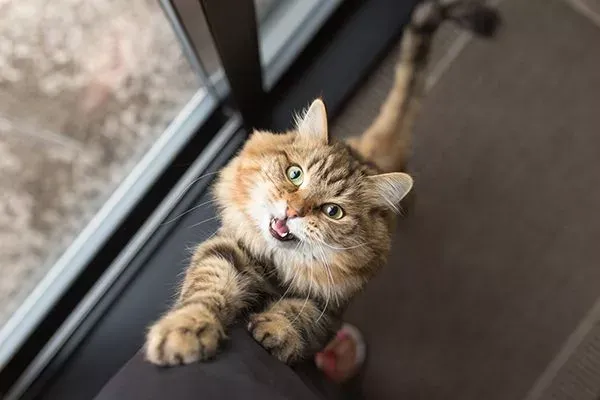If you’re wondering, why is my cat meowing excessively, you’re not alone. Cats are naturally vocal, using meows, yowls, and purrs to communicate, but a sudden increase in meowing can signal an underlying issue or unmet need. As a cat owner, understanding these vocalizations helps you respond effectively and keep your feline companion happy and healthy.
Excessive meowing often disrupts daily life, from nighttime yowls to constant demands for attention. In this guide, we’ll break down the top six reasons behind cat meowing excessively, backed by veterinary insights, and offer practical solutions. Whether it’s hunger, stress, or health concerns, knowing the cause empowers you to act.
 cat meowing excessively
cat meowing excessively
Understanding Excessive Vocalization in Cats
Excessive vocalization varies by cat personality—some are chatterboxes by nature, while others are quiet. Generally, it’s excessive if the meowing exceeds your cat’s baseline and interferes with sleep, work, or peace. For instance, a familiar dinner meow is normal, but midnight yowling warrants investigation.
Veterinarians from the American Veterinary Medical Association (AVMA) note that sudden changes in vocal behavior often tie to physical or emotional triggers. Monitoring patterns—like timing, tone, and context—helps pinpoint the issue early.
Common Reasons for Cat Meowing Excessively
1. Seeking Attention and Companionship
Contrary to the aloof stereotype, most cats thrive on interaction and dislike solitude. If your cat meows incessantly at you, it might be bored, lonely, or craving affection. This is especially common in indoor-only cats with limited stimulation.
Spend quality time petting, talking, or playing with interactive toys like feather wands. Regular sessions reduce attention-seeking meows, fostering a stronger bond. My cat is constantly meowing shares similar experiences from fellow owners.
2. Basic Needs Like Food, Water, or Access
Cats meow to request essentials, much like a child signaling hunger. An empty food bowl, low water, or blocked access to a litter box or favorite spot prompts vocal demands. Hunger is the top culprit—cats may meow before meals they’ve learned to anticipate.
Refill bowls promptly and observe routines. Experiment with puzzle feeders to extend mealtime engagement. They also meow for doors to open or TV changes—learning their “vocabulary” prevents frustration.
3. Heat Cycles and Breeding Instincts
Unspayed females in heat yowl loudly for 7-10 days monthly, attracting mates. Unneutered males respond similarly upon detecting pheromones. This instinctual drive peaks at night, disrupting households.
Spaying or neutering eliminates these cycles, reducing vocalization by up to 90%, per studies from the ASPCA. Consult your vet for timing, ideally before six months, to prevent unwanted litters and health risks like mammary cancer.
4. Stress from Environmental Changes
Cats are creatures of habit; disruptions like moves, new pets, babies, or losses spike stress hormones, leading to more meowing. Vet visits or household noises amplify this, mimicking anxiety yowls.
Create a safe haven with hiding spots, pheromone diffusers (Feliway), and consistent routines. Extra play and gentle handling rebuild security. If stress persists, rule out pain with a checkup.
5. Aging and Cognitive Decline
Senior cats (over 10 years) often meow excessively at night due to cognitive dysfunction syndrome (CDS), akin to human dementia. Vision/hearing loss, disorientation, and sundowning cause confusion, prompting disoriented yowls.
Nightlights, elevated food bowls, and stable layouts aid navigation. Supplements like omega-3s support brain health, but vets diagnose via exams. My cat stopped meowing contrasts this, highlighting when silence signals issues.
6. Underlying Medical Conditions
New or intensified meowing flags health problems like hyperthyroidism, kidney disease, pain, or diabetes—increasing hunger, thirst, or discomfort. Cats hide illness, so vocal changes are key alerts.
Schedule a vet visit for bloodwork and exams. Early intervention improves outcomes; for example, thyroid meds resolve symptoms quickly. Never ignore persistent meowing, as per AVMA guidelines.
For related behaviors, check out my cat won t stop meowing to go outside.
How to Address Excessive Meowing Effectively
Responding to cat meowing excessively starts with observation: note triggers, frequency, and accompaniments like pacing or hiding. Meet needs naturally—feed on schedule, enrich environments, and provide companionship.
If basics don’t resolve it, professional help is crucial. Vets assess for medical causes and recommend behaviorists for chronic cases. Tools like automatic feeders or cameras monitor remotely.
Cat hiding house offers tips if meowing pairs with withdrawal.
Final Thoughts on Managing Cat Meowing
Cat meowing excessively stems from attention needs, instincts, stress, age, or illness—addressing the root restores harmony. Prioritize spaying/neutering, routine care, and vet checkups for long-term wellness.
Implement these strategies patiently; most cats quiet down with adjustments. If concerns linger, contact your veterinarian promptly. For more cat care advice, explore our guides like cat hiding from me.
References
- American Veterinary Medical Association (AVMA): Feline Vocalization Guidelines
- ASPCA: Spaying/Neutering Benefits
- Journal of Feline Medicine and Surgery: Studies on CDS in Cats
